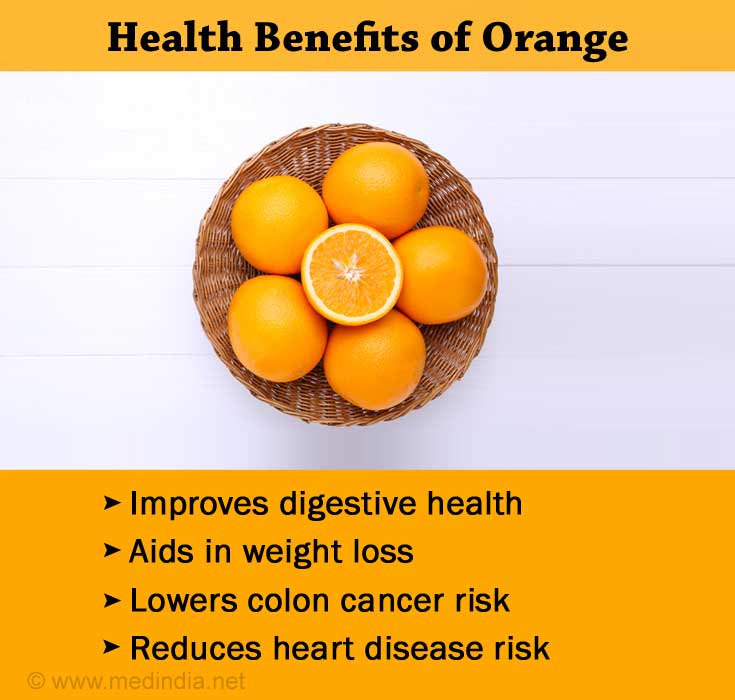- Orange (fruit)4 - (http://en.wikipedia.org/wiki/Orange_fruit4)
- Loss, Hair, Foods That Harm, and Foods That Heal. "The Health Benefits of Oranges."
- Elke Theuwissen, Ronald P. Mensink, Water-soluble dietary fibers and cardiovascular disease, Physiology & Behavior, Volume 94, Issue 2, 23 May 2008, Pages 285-292, ISSN 0031-9384 - (http://dx.doi.org/10.1016/j.physbeh.2008.01.001.)
- Sánchez-Moreno, Concepción, et al. "Effect of orange juice intake on vitamin C concentrations and biomarkers of antioxidant status in humans." The American journal of clinical nutrition 78.3 (2003): 454-460.
Why People Like Oranges?
Oranges are the most widely consumed of all citrus fruits because of their fantastic taste when eaten raw. Also, they lend themselves easily to a variety of food products, from orange juice and marmalades to orange candy and desserts and even face masks, that smell almost appetizing because of their orange aroma.

Considering their natural sweetness and hardy skin or rind that makes them less susceptible to damage during transportation, oranges are among the most popular of all fruits across the world. In other words, they taste great and don’t pose as much of a problem as other perishable goods.
Oranges can be bitter or sweet, but it is the sweet variety that wins in popularity. There are different varieties of oranges like mandarin oranges, blood oranges and Valencia oranges, and they are generally seasonal with peak availability from winter through summer. The skin of the fruit, like the flesh, is a distinctively orange color, although it can also be green. The skin varies in thickness and the fruit itself is round and about two or three inches in diameter.
Oranges make for a great snack and are a healthy addition to any diet because of their low caloric content and high nutritional value. They offer a whole range of health benefits from boosting your immunity, to promoting healthy skin and improving the digestive process.
Most of us tend to consume only the pulp of the orange, while discarding the rind, but the rind is in fact concentrated with nutrients. Try and use the rind as well in your cooking to get more nutrients out of the orange. Many nutritionists regard the orange as a super-food because of the amount of health benefits it has to offer. An orange contains a huge variety of phytochemicals and flavonoids, which are believed to help improve your general health and well-being.
Health Benefits of Orange
It’s hard to do justice to the orange in any kind of list of health benefits, but here are some of its most notable health benefits:
- Oranges are extremely beneficial for the overall health of your digestive system because of its high fiber content and the type of dietary fiber they contain. Most of the fiber content in the orange is located in the skin and just on the surface of the flesh and the dietary fiber is called pectin. To derive the most out of this nutrient, try not to get rid of too much of the white skin that is on the surface of the flesh and just beneath the rind. It would be a good idea for anyone who suffers from constipation or bowel irregularities to include oranges in their diet as pectin works like a bulk laxative. It is also believed to help improve the health of the colon and lower the risk of colon cancer by protecting the mucous membrane from toxins.

- The soluble fiber in orange doesn’t just offer benefits to your digestive system. Soluble fiber is known to help bring about a reduction in cholesterol levels, as it binds with or picks up excess cholesterol compounds when it travels through the intestinal tract. It is then eliminated from the body along with the fecal waste. This cholesterol-lowering effect lowers your risk of heart disease as well. Half of the fiber content in orange is made up of soluble fiber.
- Like many other citrus fruits, oranges are renowned for their effect on immunity. The immune-boosting benefit of oranges derives from its high content of vitamin C. Just 100 grams of orange will provide you with close to 90 percent of your daily required intake of vitamin C, which is essential for the optimal functioning of the immune system.

- Oranges are also loaded with phytochemicals and flavonoids like hesperetin, naringin, and naringenin. These antioxidants help to lower the risk and delay the onset of degenerative disease because of their protective effect against free radicals. Naringenin has also been found to demonstrate an anti-inflammatory effect.
- Oranges are also a great source of vitamin and other antioxidant flavonoids like beta carotene, beta-cryptoxanthin and lutein. Vitamin A is extremely important not just for maintaining healthy vision but also for the health of your skin and mucous membranes.

- Oranges are a good source of potassium, which is essential for healthy heart function. Potassium, along with other essential minerals like calcium, magnesium and sodium work to maintain optimal fluid levels around cells. Low levels of potassium can affect heart function causing an irregular heart rhythm known as an arrhythmia.
- Oranges make a great addition to any diet for weight loss because they are nutrient-dense and low in calories. This can be particularly helpful to individuals who tend to overeat and need to snack in between meals. The orange can serve as an effective substitute to between meal snacks as it does not give you any of the calories you would get from junk food, but its high fiber content will ensure that you stay satiated for quite a while.
While many of these nutritional benefits can be derived from fresh orange juice and to a lesser extent from orange food products, whole oranges remain the best source of all these nutrients as a lot of the nutrition is lost in juicing and processing. The rind of the orange, which is usually discarded, contains an even higher concentration of nutrients but eating the orange skin raw isn’t recommended for the simple reason that most people would find it unpalatable. You can, however, use it in your cooking.
Orange Recipes
Oranges are generally eaten raw, but they can also be used in various cuisines to make a wide variety of dishes, from bakes and pies to desserts and sorbets. Oranges are also popular in fruit salads and there are also plenty of dishes that require just the rind, making sure that no part of the orange goes waste! Here are some recipes you can try at home.
Orange Almond Cake
Ingredients:
- Oranges (2)
- Caster sugar (200 grams)
- Eggs (half a dozen)
- Ground almonds (Quarter kilo)
- Flaked almonds (4 tablespoons)
- Basil leaves (50 grams)
- Water (50ml)
- Caster sugar (50 grams) Yes, that’s in addition to the 200 grams of sugar!
- Lightly whipped double cream (150ml)
- Split Vanilla pod (1 pod, with seeds scraped)
Preparation:
- Preheat your oven to 180C.
- Grease a 9-inch cake tin.
- Heat water in a saucepan and immerse the oranges in the water, allowing it to simmer for almost an hour or until they have turned soft.
- Turn off the heat and allow the oranges to cool down in the water.
- Once the oranges have cooled, drain water and chop the oranges. Get rid of the seeds while chopping.
- Blend 450 grams of the chopped oranges in a blender, mixer or food processor.
- Add 200 grams of sugar, eggs and ground almonds to the puree and continue blending until the mixture has a smooth consistency.
- Pour the mixture into the greased cake tin carefully and sprinkle the flaked almonds over the top.
- Put the cake tin into the oven and allow it to bake for close to 30 minutes.
- Before half an hour is up, make it a point to cover the top loosely with aluminum foil.
- Continue baking for another 30 minutes. Use a skewer or knife to check if ready. When inserted in the center, the knife should come out clean.
- You can remove the cake tin from the oven and leave it to cool.
Here’s where your second lot of sugar comes in handy:
- Fill a saucepan with the 50ml of water and add the basil and sugar to it.
- Boil the mixture and allow it to simmer for two minutes.
- Blend this mixture in your food processor or blender until it has a smooth consistency.
- Once you’re done blending, pass the mixture through a fine sieve to get rid of any bits or lumps.
- Set the bowl with your basil syrup aside to cool.
- You can now whisk the whipped cream and vanilla seeds and once soft peaks begin to form you can go ahead and add the basil syrup.
You now have basil cream, which you can use as a garnish for the cake. Serve each slice with a dollop of the cream.
Interesting Facts
- Oranges became so popular that they were even used as a present for Christmas day in England during Queen Victoria’s reign.
- British ships in the 18th century were stocked with oranges and other citrus fruits to prevent diseases like scurvy.
- We take for granted that oranges are orange in color, but they can turn green in warm weather conditions. This, however, doesn’t mean that they won’t taste good.
- Oranges were only introduced to the ‘New World’ in 1493, but Brazil is now the world’s leading producer of oranges.
- Orange juice is the most popular of all fruit juices in the United States and 90 percent of its orange produce goes into making juice.
Useful Tips
- When buying oranges, the size of the navel is a good indicator of sweetness, with sweetness increasing with greater navel size.
- The fruit should be firm rather than soft, but not so firm that it doesn’t yield to pressure.
- If you notice any spots or the appearance of mold on an orange do not buy it. Likewise, oranges that are too soft should also be avoided.
- If you don’t intend to consume oranges right away, keep in mind that they can last for a week. If you need to hold on to them for longer, make sure to keep them refrigerated but away from any excess moisture.
- Oranges are susceptible to contamination with pollutants because of the heavy and widespread use of insecticide sprays. For this reason, it is advisable to wash oranges well under running water before consuming them. If organic oranges are available in your local market, you can also opt for these as they are completely free of any pesticides or chemicals.






